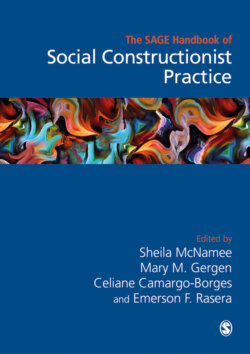Читать книгу The Sage Handbook of Social Constructionist Practice - Группа авторов - Страница 116
На сайте Литреса книга снята с продажи.
Conclusion
ОглавлениеThere are many ways to approach relational research. Kenneth Gergen, in his article on research as future forming (2015), invites us to explore new routes, new ways to understand our daily practice.
The most productive route in this case is not to embark on a disjunctive, imaginary world – a world of inquiry beyond the reach of contemporary researchers. Rather, it would seem more promising to examine current and emerging practices with future forming potential. If such practices can be illuminated in terms of this potential, a new consciousness may be germinated. New and more potent practices may be stimulated. In certain respects, then, the present offering may serve as a mid-wife to a movement in the making. A voice may be given to an otherwise unarticulated sensibility, thus giving form and function to future undertakings. (p. 305)
Reflecting on Gergen's words, we would like to suggest that dialogic practices, being in psychotherapy, education, organizational development, or research, are creating a new way of approaching the complexity in which we are living; it is through dialogue that we will create the future for the seven generations to come. We have seen already results of these practices in vastly different projects like Imagine Chicago conceptualized and facilitated by Bliss Browne (1998, 2002, 2005, 2009) based on Appreciative Inquiry; the work of Jakko Seikkula (2002, 2003; Seikkula et al., 1995) with Open Dialogues when working with schizophrenic patients that has extended beyond Finland and the rest of Europe, to the United States and Latin America; and the dozens of projects developed by members of the International Certificate of Collaborative-dialogic Practices (ICCP) in 18 different countries.
We think it is fitting to close this offering of our inquiry practice, aware of the continuous changes happening as new voices and reflections join, with the voice of Carolina.
After having read what me and Christian and Cynthia said, I am left thinking that for me, relational research is a living, generative, relational process of mutual discovery, framed by freedom and uncertainty in each of the participants, which hits us and transforms us. A unique process for each one of the inquirers in each one of the inquiries that he/she gets engaged in. Therefore, it seems that we can speak of processes of dialogical inquiry rather than relational research as that which is done in a single way. The ways, the approaches, will be decided by the same participants during the emerging process. I am also thinking about the therapeutic aspects of dialogue, and therefore, about Dialogic Social Inquiry. Even if this is not part of the intentions, it seems to be one more of the responses of this transformational process.
